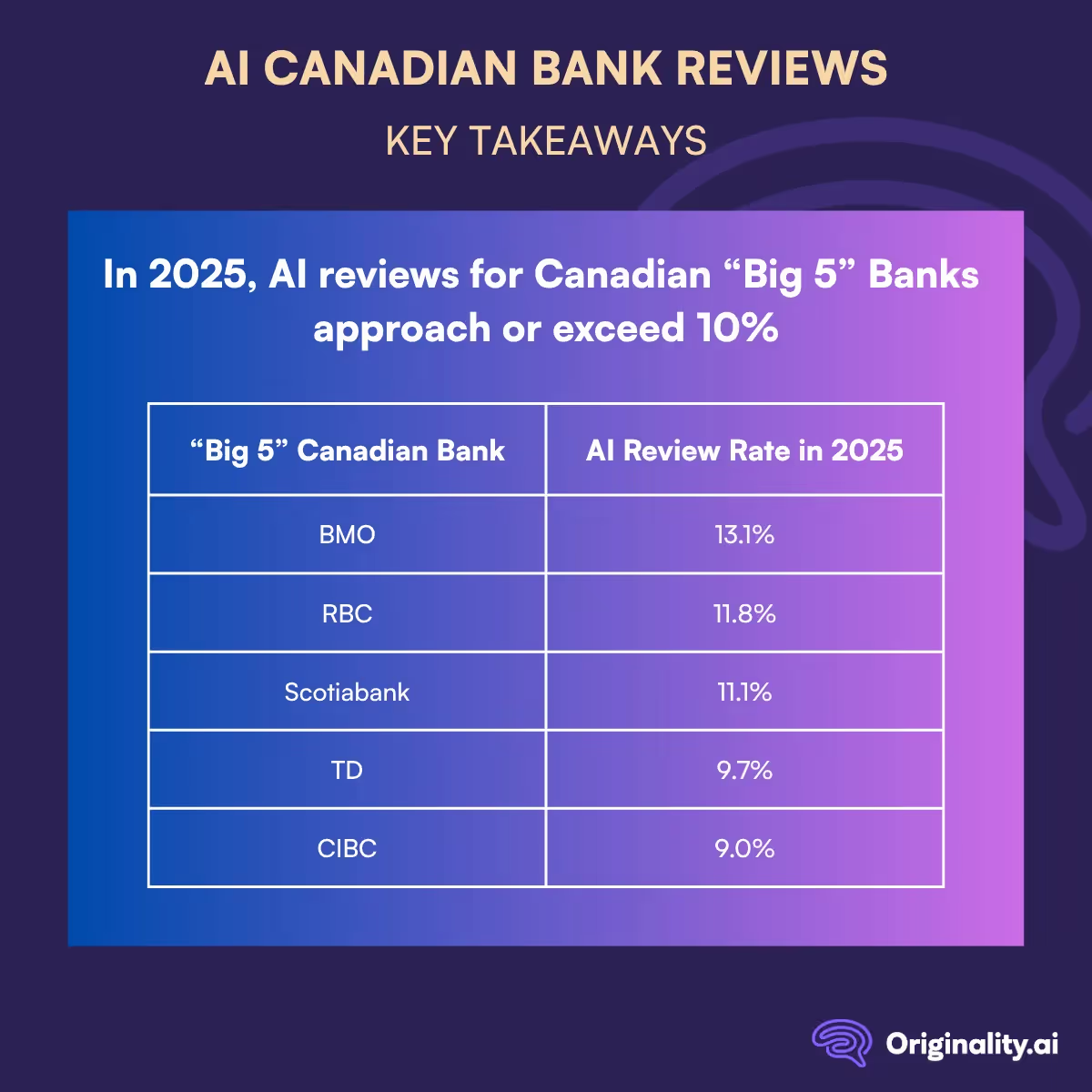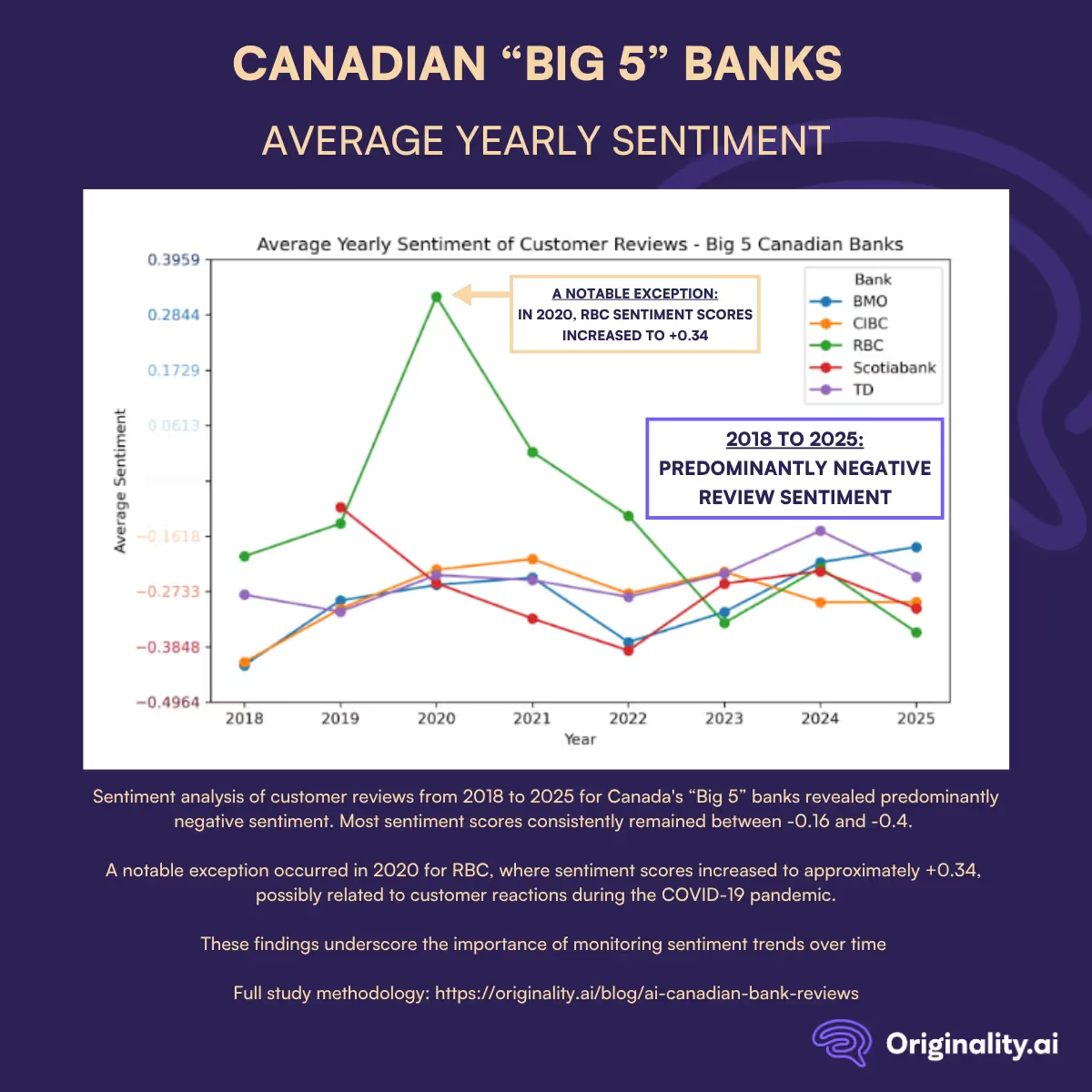Artificial Intelligence (AI) has increasingly become an integral component of numerous industries, profoundly transforming the landscape of customer interactions, reviews, and feedback mechanisms.
In the financial sector, particularly within Canada's "Big 5" banks — BMO, CIBC, RBC, Scotiabank, and TD — understanding the prevalence and implications of AI customer reviews has become critically important.
Customer reviews play a vital role in shaping public perception, influencing customer decisions, and guiding service improvements. However, the emergence of AI-generated content poses potential challenges regarding authenticity, reliability, and consumer trust.
This study investigates the rates of AI-generated customer reviews from 2018 to 2025 for each of these major Canadian banks.
By quantifying the extent of AI-generated content, we aim to illuminate patterns and trends that may indicate the degree to which these technologies are influencing online review landscapes within the banking sector.
Complementing this analysis, sentiment analysis is employed to evaluate how reviews compare emotionally and tonally across the time period studied.
This dual analytical approach will offer comprehensive insights into:
The findings of this study will help banks, regulators, and customers navigate the evolving complexities introduced by AI, ultimately fostering a more informed and reliable digital consumer feedback ecosystem.
We’ve included a quick reference chart below of the comparative AI review rates for each of these banks in 2025:


The analysis of AI-generated review rates reveals a pronounced shift in customer feedback for Canada’s Big 5 banks from 2018 to 2025.
Beginning uniformly at 0.0% in 2018, indicating no detectable AI-generated content across BMO, CIBC, RBC, Scotiabank, and TD, all institutions experienced emerging and accelerating rates of AI-generated reviews by 2025.
This overarching trend underscores the rapid integration of automated review generation within digital banking ecosystems.
BMO exhibited the most dramatic change, with its AI-generated review rate climbing from 0.0% in 2018 to 13.1% in 2025:
RBC and Scotiabank also entered the double-digit territory by 2025, rising to 11.8% and 11.1% respectively — up 11.8 and 11.1 percentage points from their 2018 baselines.
Meanwhile, CIBC and TD showed more moderate yet still significant increases, reaching 9.0% and 9.7% AI-generated review rates by 2025, representing 9.0 and 9.7 percentage-point gains, respectively.
Although these figures (for CIBC and TD) are lower than those of BMO, RBC, and Scotiabank, they nonetheless reflect a clear upward trend and suggest that adoption of AI-driven reviews is becoming commonplace across the sector.
The variation in growth rates across banks may reflect differences in:
Collectively, the jump from 0.0% in 2018 to rates approaching or exceeding 10% by 2025 signals a transformative shift in how customer feedback is generated and perceived.
Overall, these findings highlight critical implications for authenticity, consumer trust, and regulatory oversight as AI continues to reshape the banking review landscape.

Sentiment analysis of customer reviews from 2018 to 2025 for Canada's Big 5 banks revealed predominantly negative sentiments, with most sentiment scores consistently remaining between -0.16 and -0.4 throughout the eight-year period.
This negative sentiment trend may indicate:
A notable exception occurred in 2020 for RBC, where sentiment scores increased to approximately +0.34, significantly deviating from the otherwise negative baseline observed for all banks.
This positive sentiment shift in RBC's customer reviews aligns closely with the timing of the COVID-19 pandemic.
It could potentially be reflective of favorable customer reactions to RBC's pandemic-related initiatives, such as:
Aside from this temporary positive deviation observed in RBC’s 2020 data, no similar positive sentiment shifts were observed for the other banks during the study period.
The overall sustained negative sentiment highlights a consistent level of critical consumer perspectives, potentially emphasizing areas for improvement in customer experience, satisfaction, and institutional reputation management.
These findings underscore the importance of monitoring sentiment trends over time, especially in response to external, significant events.
In conclusion, this study highlights both the challenges and opportunities that rising levels of AI-generated content and customer sentiment (which this study found to be predominantly negative) pose for Canada's banking sector.
Ongoing negative sentiment underscores the critical areas where banks must focus their improvement efforts.
Simultaneously, RBC's positive sentiment experience during the COVID-19 pandemic may reflect the impact and influence of significant external events on consumer satisfaction.
Banks that effectively address AI-generated content in reviews as well as consumer sentiment as part of their operational and strategic frameworks are likely to strengthen customer loyalty and overall reputation in a competitive financial services landscape.
Do you have concerns over whether a post or review you’re reading might be AI-generated? Use the Originality.ai AI detector to find out.
Read more about the impact of AI on online platforms:
This study analyzed AI-generated customer reviews of Canada’s Big 5 banks — BMO, CIBC, RBC, Scotiabank, and TD — using web scraping methods from prominent review platforms such as ConsumerAffairs and Trustpilot.
Reviews were collected via Python scripts. Specifically, the BeautifulSoup and Requests libraries facilitated automated retrieval of review content and associated metadata (dates, review texts) from these platforms. This data was then structured and saved into CSV files for subsequent analysis.
Reviews with 50+ words were analyzed using the Originality.ai API to assess AI-generation likelihood. A Python script automated API calls, handled errors, and saved results (review content, date, bank, AI scores/classification) after every 500 reviews.
This structured process ensured accurate detection and trend analysis of AI-generated reviews from 2018 to 2025.

Is that LinkedIn post you’re reading real or Likely AI? We ran an updated 2025 dataset to find out! Plus, we took an in-depth look at how Likely AI vs. human-written content impacts engagement. These are our research findings.